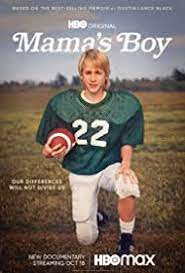
MAMA’S BOY
US, 2022, 102 minutes, Colour.
Dustin Lance Black and family.
Directed by Laurent Bouzereau.
This is an interesting, often arresting, documentary portrait of a family based on the novel, Mama’s Boy: A Story of Our Americas, written by Dustin Lance Black. And he has written the screenplay for this documentary which has been directed by prolific director documentaries and short films, Laurent Bouzereau. It is a film with many significant themes dramatised and explored throughout.
The film opens with Dustin Lance Black receiving an Oscar for his screenplay for the 2008 film, Milk, based on the life, work and assassination of San Francisco representative, Harvey Milk. Black gives a rather impassioned speech to encourage, especially young gay men, of changes in American consciousness and legislation. Which establishes him and his cinema work, and introduces him as the host of this documentary, a personable host, articulate, earnest and committed.
However, the first 25 minutes of the film focuses on Black’s mother, Rosanna, called Anne, the poor background of the family in Louisiana, going back to the early 20th century, her birth in 1948, the period of the prevailing of polio and her life with polio, doctors pessimistic about her survival, yet her showing enormous determination, her energy to walk again with splints and crutches, difficulties with family in accepting her condition, but her decision to study, get a scholarship, study medicine. And there is a lot of film footage of her as well as the comments by Black himself. She was also warned against marriage because having a child would kill her – but, she married, and had three children. She was encouraged by the Church of Latter Day Saints, devoted and devout, and their guidance in recommending two husbands (one who eventually abandoned his wife and three children, the other sadistically brutal).
Anne is seen throughout the film, eventually marrying a supportive husband, also interviewed throughout the film, and working for the American military the decades in medical laboratories.
This aspect of the film is significant, an opportunity to appreciate the impact of polio in the early 20th century, the importance of Jonas Salk and his discoveries, but the consequences on those who contracted the disease.
Another important aspect of the film is domestic violence, Lance Black calmly but emotionally recounting his experience of his father, the next step father and his even murderous violence. Not only the effect on Anne, but on the three children.
The film was also interesting on the theme of family, the eldest son, Marcus, joining gangs, drugs, drifting, and, rather later in life, coming out as gay, an up-and-down life, dying before his mother. The younger son, Todd, interviewed throughout the film giving a further perspective on the stepfathers and his mother, his support of the family, marrying and having his own family.
And, throughout the film, there is the theme of sexual orientation, public attitudes in the American south, Lance Black aware of his orientation but suppressing it for a long time. There is an interview with a close friend who was very supportive, and still is, as well as his partner, British athlete, Tom Daley, whom he married in 2017.
While he worked in Hollywood on television projects on short films, invited to make the film, Pedro, about a gay athlete, he achieved success with his screenplay for Milk, going on to write other screenplays including J.Edgar,
But, urged on by his mother who was initially shocked by the thought of his orientation but who came to visit him in Los Angeles and listen to the stories of his friends, he became an advocate from 2009 onwards for LGBTQI+ causes, combating propositions against same-sex marriage, a great deal of writing and public speaking, and the change of attitudes over the years and changes in legislation.
As she was dying, Anne urged her son to fight for her life. He was puzzled by what she meant – but, in writing his book and in making this film, he has definitely fought successfully for his mother’s life.